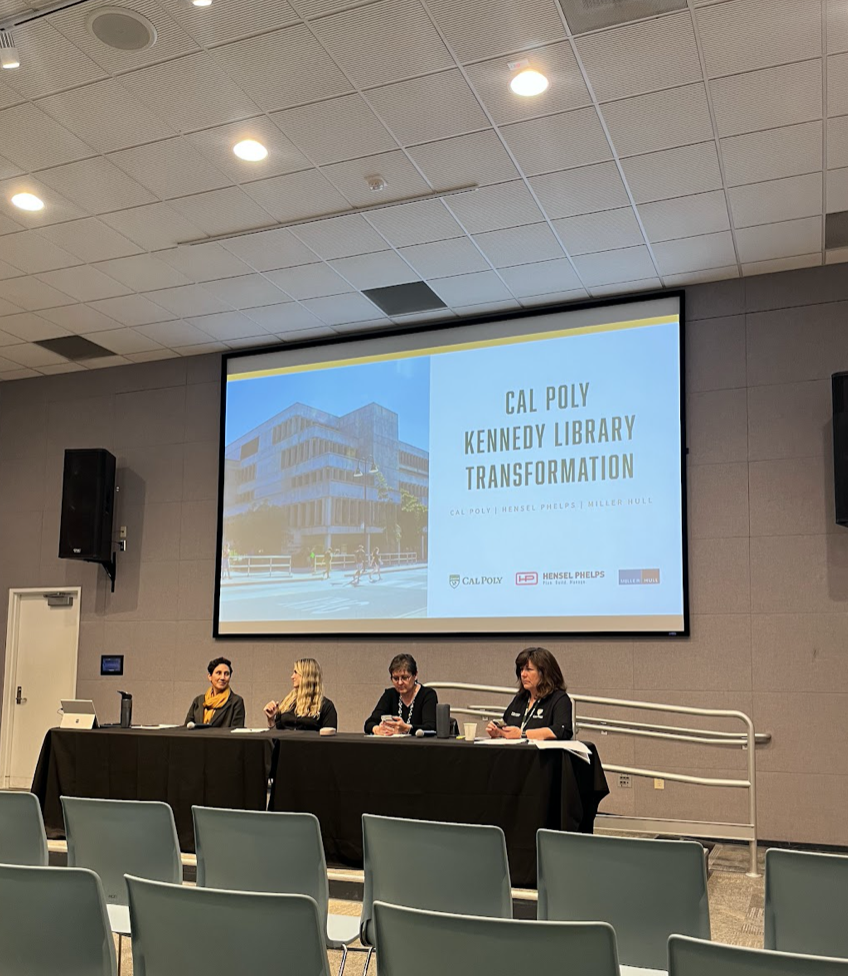Library town hall answers renovation questions

New updates on the partial renovation of the Cal Poly Kennedy Library have been released at the town hall meeting on Monday May 15.
The meeting was led by four of the project team members including the Dean of the Library as well as architects and project managers who have been working on this renovation since 2017. At the end of June 16, the last day of finals for spring quarter, the building will finally close to start moving out books.
Books will be moved into Building 82, Crandall Gym, Dexter and into dark storage. The new mains service hub will also be in Crandall Gym consisting of the Research Center, Help Desk, Digital Project Cloud Catalog and copy station.
The Special Collections Operation Center will be in the Graphic Arts building. Project manager with Cal Poly Facilities Planning and Capital projects, Penny Sandman, wants to reassure students that all resources will still be available to them during the closure.
“We do want to emphasize the building is closing down, but not the service,” Sandman said. “It will be different than what you have, but we anticipate all of those services and programs to be still available to the campus. We know they’re critical.”
Construction will begin in August. There will be a complete renovation of the first floor, the courtyard and Hub24 will extend to the second floor as well.
The project group focused on making sure renovations upgraded safety measures and made the building more sustainable.
Various columns through the building will be strengthened, and low flow plumbing, more all gender bathrooms, new fire sprinklers and fire alarms will be installed. The main architect, Danielle Buttacavoli, said the project team stretched their budget to make environmentally sustainable changes.
“All of those things together will reduce the energy costs and allow us to have a more sustainable building,” Buttacavoli said. “We’re trying to be as strategic as possible with some of these elements to try and solve multiple problems.”
To address sustainability and prioritize thermal comfort, there will be new LED lights, insulating glass windows and air conditioning.
“We know that the library has had to close down at times just because it is so hot inside the library, and so really looking for meeting the thermal comfort goals and making sure that we’re providing a comfortable place for students to study,” Buttacavoli said.
The main staircase in the existing building will be completely redone and moved to gain additional space for students to study.
Right now the library holds 2,400 students, but will hold 2,700 after the renovation is completed.
Microbiology sophomore, Victoria Lancaster, is part of the many students who are worried there won’t be as much study space available on campus when the library closes.
“I think it’s great that they’re putting in new outlets on the first and second floor and opening those study spaces, but is it going to make it more like loud or anything,” Lancaster said. “The fact that they’re not fixing the third through fifth floor outlets. There’s so many of them that don’t work.”
Members of the project are currently working to extend hours in the University Union to make the space available 24/7 for studying.
They are also currently working on making classrooms available at night. Two temporary structures will be put into parking lots C-7 and H-11 that will consist of 10-foot clear panel walls and artificial turf for internal heating.
The parking spots no longer available because of these structures will be moved to parking lots H-12 and H-16.
The continuous renovation of Marketplace 1901 is also expected to open in the middle of next year to accommodate 600 more spaces.
“We know from before that renovation started and we know with the design now that it’s really accommodating to have the students collaborating there and studying there, as well as dining,” Sandman said.
Students are still worried about the efficiency and safety of these temporary structures and study spaces.
Issues such as these will continue to be discussed with an executive committee that has been consulted throughout the process consisting of members of various areas on campus.
“I walk at night at like one or two a.m. to get to my car to drive home or get a ride or whatnot,” Lancaster said. “It’s like, I don’t want to be walking across campus so late in the dark. I’m not happy with that. I don’t like the plans.”
Students and faculty can expect the Kennedy Library to reopen in Fall of 2025.

